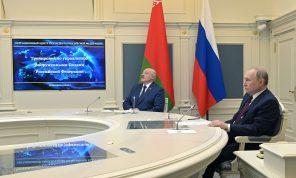LONDON- “Al-Quds Al-Arabi”: The Financial Times has devoted an editorial to the Middle East position under the title “Shades that camp over the Middle East”, in which it stressed the importance of reviving the nuclear agreement with Iran and that it is a key to restoring stability to the region.She said that the most important pivotal question for the Middle East for this year is is there an opportunity to re -float an international agreement that restricts Iran's nuclear ambitions after Donald Trump blew up the 2015 agreement signed by the United States and 5 world powers with Iran?.The alternative to this is the increase in the agency's war from Iran and its Arab Shiite allies from the East to the Gulf, and the worse of this is the war that Israel has been threatening and that may be wasted without control during most of the region.
Perhaps the Middle East has reached this dangerous turn at a time when the United States has been dominating since World War II to get out of it.And now he looks at the United States as an unreliable power of friend and enemy.This outlook from the chaotic exit from Afghanistan did not start last summer or even Trump's exit from the nuclear agreement in 2018 and from one side, even though the allied countries of Washington, such as Israel and Saudi Arabia, opposed it strongly.Indeed, the idea was rooted when Trump was shockingly ignored Iran's missile attack and the devastating and accurate marches against Saudi oil installations in 2019.At that time, Trump considered that the attack was not directed at the United States, but rather to Saudi Arabia.Since that time, diplomatic communication channels have opened with Iran and most of the Gulf states, including the United Arab Emirates and Saudi Arabia.The feeling of the Gulf states that they are at risk led to a move to reduce tension.With the militants control the joints of the force in Iran, these moves seem less than a call to release.In light of the blockage in the nuclear talks in Vienna, where negotiators are committed to texts, they must not change without the permission of Tehran, the diplomatic efforts are doubled.The newspaper said that the lines of communication continued between the UAE and Saudi Arabia, as well as Israel and the United States.The Crown Prince of Abu Dhabi and the actual ruler of the UAE, Sheikh Mohammed bin Zayed, the Israeli Prime Minister Naftali Bennett, who opposes the nuclear agreement with Iran, received a historical visit clearly related to the diplomatic openness that the Crown Prince started in 2020 with Israel.Sheikh Tahnoon bin Zayed, the brother of the Crown Prince, his adviser to national security and his call point in the region, interviewed Iranian leaders in Tehran last month.There is news carried by the wind, such as Iran's approval to re -install the United Nations team, surveillance cameras in nuclear facilities, but the opportunities for return and adherence to the terms of the 2015 agreement are unclear..Iran may have changed its extremist position.Israel, the only nuclear force in the region, continues its campaigns to sabotage Iranian nuclear installations.On the other hand, Tehran does not bear any challenge to the strength of its military militias in Iraq, Syria and Lebanon and its ballistic missile programs..The newspaper says that the road is long for the countries of the region to learn and share the region, according to President Barack Obama and continues to see him now President Joe Biden.These countries have not been able to reach a rapprochement and offer hope for their people and an honorable life. It is easy to see how hard -line Sunni groups will use failure..The prevailing concepts of the care of America and Israel will continue to provoke the coalition of strong men from the heretic Shiites and the Sunnis who have completed the course of the return of dictatorial domination after they buried the hopes of the Arab uprisings in 2011, and this is fertile soil for the toxic jihadist return.

